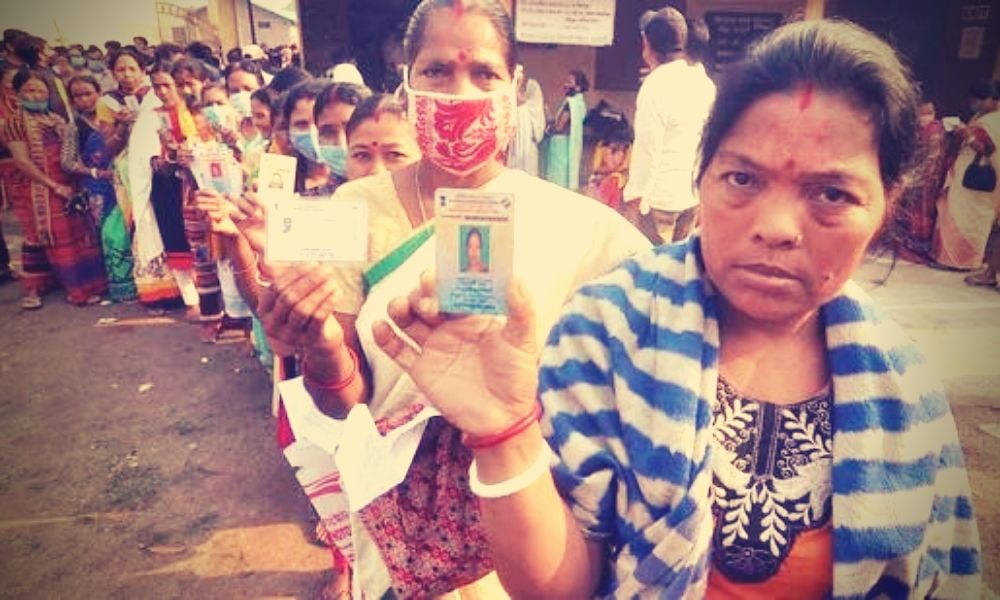
Image Credit: ANI
Opinion: Big Data Revolutionised Politics Giving 'Big' Win For BJP In Assam
Assam, 6 May 2021 6:18 AM GMT | Updated 6 May 2021 6:19 AM GMT
Creatives : Rakshitha R
Rakshitha an engineer turned passionate journalist with an inclination for poetry, creative writing, movies, fiction, mountains and seclusion. Not a part of the social process but existential.
Parties implement new methods focusing on collecting and organising data for targeting voters, apart from traditional ways of on-ground campaigns or divide and rule policies based on caste or community.
Big data has revolutionised the way political parties worked to win the elections. Parties implement new methods focusing on collecting and organising data for targeting voters, apart from traditional ways of on-ground campaigns or divide and rule policies based on caste or community. The recent landslide victory of the BJP in Assam elections for the consecutive second term irrespective of ongoing CAA, NRC issues is evident to its game, taking up data science in politics.
BJP has precariously focussed on 'one voter one strategy' treating voters uniquely with a customised strategy. Voter Individual Profile (VIP) designed to collect voter information was curated by the party to reach voters along with support from tech consulting agencies like Jarvis Technology and Strategy Consulting, an organisation associated with BJP for quite a long now that advises the party on Tech & Data solutions.
The party teaming up with 35 lakh primary members (Prathmik Sadasya) and 26 lakh Karyakartas have worked to keep 1.19 Crore beneficiaries, who directly benefited from the party's schemes and subsidies over the past years on top priority. The team has emphasised on 1.2crore general voters in Assam, the BJP claims to have collected through 'missed call campaigns' and 'door-to-door-out-reach'. The next step involved assimilating voters' data and segregating into four categories and bifurcating them based on gender, age and category to map them to their respective booth. The party has also ensured to call up the voters to verify the accuracy of the repository.
The party, now aware of each individual's category along with intricate details like booth num-ber began to work on the 'Voter Individual Strategy (VIP)'. BJP's astute brains came up with a distinctive strategy for every single voter. The strategies were thoroughly planned, discussed and finalised. Such organised data were used to reach out to voters over multiple channels like mobile calls, SMS, voice recorded messages and social media like WhatsApp and other messaging platforms. For instance, a woman voter from Assam's Tea-Tribe community will get messages about how the party hiked wages for Tea tribes, other community-specific schemes like Chat Baigchar Dhan Puraskar Mela and about women-centric schemes.
"VIP aided the party in developing a better understanding about each electorate and helped us in identifying their needs and their demands in a better way. Hence, we could customise our approach towards them in a more wholesome and inclusive way," said Jiten Sarma, Spokesperson, Assam BJP.
Apart from the party's devised voter specific strategies, it also spread its focus on micro-targeting to the booth level. Big Data has also helped the party to implement booth level strategy where the team has singled out booths on which BJP either registered a victory or a defeat by a thin margin or held a fairly favourable voter base. Terming it as 'Critical Booths', the team began its drive to identify BJP's traditional voters from these booths. Once spotted, these voters were then motivated to influence the other electorates hailing from their very discourse community.
Similarly, the 'Push Booth' segment was incorporated to reach out to those BJP supporters who have not been exercising their franchise. This ensured at least a 4-5% surge in polling percentage at Push Booths while maintaining the favourable electorates at Critical Booths.
Sharma explained that micro-targeting via action plans like Push Booths and Crucial Booths helped us build an understanding about those areas where strategies like VIP were received in a better way than some of the places. "This doesn't mean the communication stops in other booths but it helps us track the penetration of success rate of our strategies and then prepare our next line of action," he said.
Data Analysis Used For Booth Strategy
The BJP formed a booth team consisting of 11 Karyakartas with active teams of around 25 lakh members on around 28,205 booths. The cleaned collection of the mapped data of voters, beneficiaries and primary members in addition to the publicity material and collaterals, were shared with the booth team to visit the voters door-to-door and build conversations specific to the respective voter profile. Booths were very systematically classified into four categories-ɑ (Alpha - Safe), β (Beta - Critical), ɣ (Gamma - Push), and θ (Theta - Difficult)accounting on three parameters:1 - The results of the past four elections on that particular booth.2 - The density of karyakartas, primary members and beneficiaries and 3 - The feedback from the booth team on the ground.
A particular booth team to monitor activities on the ground was initiated to ensure getting live feedback from the ground and constant reporting of the same to the Vidhan Sabha In-charge, the District Committee and the State leadership to take specific actions accordingly.
This classification has helped in formulating the strategy and outreach plan customized for that particular booth, resulting in better numbers. And thus, every voter could be examined and targeted based on the Voter Individual Profile (VIP) and booth's category.
When questioned if the candidates are ignorant about the people in their ward and consider only people who voted for them, Sharma said the main motive of VIP is to reach out to individual after building a comprehensive understanding about him/her. This itself explains how the party and its candidates didn't keep their specific focus on voters hailing from certain caste or profession but each one of the electorates.
"Generally, it is perceived that during elections, the political approach is more of a 'one-way communication than an interactive conversation'. Having proper data, helped us break this convention and build those conversations with each of our electorates, making the entire process 'people-centric. This gave people the confidence that BJP is one party which has been relentlessly working on understanding their needs and the sentiment ultimately translated into votes," Sharma added.
This exercise has helped the BJP turn the battleground into a victory land of opportunity, by convincing the average citizens on how they have served over the last five years.
Questioning Sharma on why this strategy may not have worked in other states, he said, " The party and its strategists did try a crude version of it during Lok Sabha elections but in Assam, we just took it to next level. Given its success rate in Assam, an approach along similar lines might be crafted for other states in future taking the socio-political and demographic information of that specific state into consideration as each state is unique in its own way."
One of the leading strategist involved with planning and execution of strategy making for BJP's Assam elections, who preferred to be anonymously answered questions on the role of Big Data in politics.
1) Has big data improved our politics in any way? Has it made politicians more responsive to their constituencies?
Big data in politics is essentially a combination of massive technology power and endlessly detailed voter information.
Taking cues from data analysis, parties at the state-level now have a better understanding of the electorates and their key details such as the socio-profiles, past benefit records, caste/community clusters, their opinions on pertinent issues, etc. Not only that, they hold these details at a very micro-level, precisely till the booth level. Possessing this kind of data only results in improved decision making while devising outreach strategies and while assimilating inputs for the manifesto. Data has changed the political landscape of the country in many ways and has made the system more conspicuous. For example, it has introduced more transparency in resource allocation, has optimized usage of resources, has helped in coming up with more customized and demography-centric manifestos, etc.
Hence, these days, candidates have started using these kinds of data points to interact with their constituents with a more personalized and improved approach.
2) Is big data an example of technology outpacing politics and changing things in ways we didn't expect and now can't control?
Nothing is constant but the change. In past, we have witnessed the newer technology taking over the obsolete/older ones like the television took over the radio while the former itself has been, to some extent, replaced by internet/social media. However, such technological revolutions were never able to outpace politics and the same holds true for Big Data as well. On contrary, the technological advancements have only assisted in streamlining things in the domain. Please note, these are just tools that come in handy in improving certain aspects of political campaigns and analysis. Since Big Data is a relatively newer concept, we might be having doubts about bracing it but sooner or later we will get comfortable with it just like we did with TV, Radio and mobile sets.
3) How do these changes at the campaign level impact actual policymaking? If candidates are talking more and more to their own teams, and if they're only responsive to their people, does that not lead to uncompromising governing strategies?
Not at all, in fact, the situation has improved with the advent of big data. In the past, MLAs & other lawmakers were dependent on social listening, oral feedbacks and some ground analysis on which policies etc. were drafted leaving room for discrepancies and inconsistency. In most of the cases, the policies were not executed on the basis of any matrix or Key Performer Indica-tor (KPI) and one could easily spot the gap between the 'on-paper plans and 'on-ground execution. Unfortunately, there was no mechanism to verify or to track the execution, the success rate and the loopholes of any policy and we had to rely on whatever data was presented to us. However, now, with the advent and implementation of Big Data, decision making in policy has become more holistic, inclusive and most importantly, can easily be cross-checked. Hence, these days, one has to be more scrupulous and smart while implementing policies.
Also Read: COVID-19 Relief: Samsung Pledges $50 Lakh, Paytm To Set Up Oxygen Plants In 13 Cities
 All section
All section













